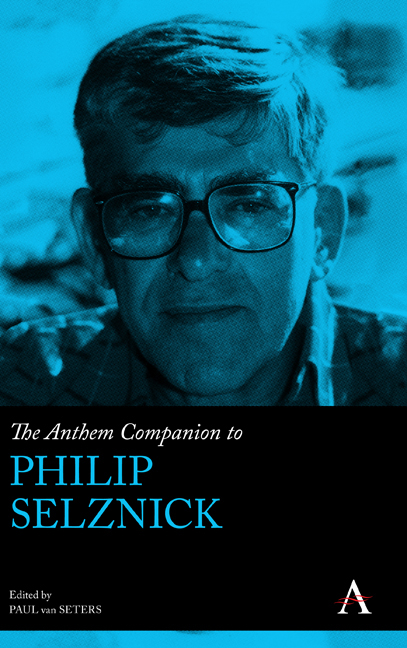Book contents
- Frontmatter
- Contents
- List of Contributors
- Chapter 1 The Intellectual Enterprise We Call Sociology
- Chapter 2 Philosophy for the Twice-Born: Selznick and Dewey in Dialogue
- Chapter 3 Power Relations across Organizations and Fields: Building on Selznick’s Concepts of Co-Optation and Institutionalization
- Chapter 4 Organizations, Institutions, and Law: The Sociological Significance of Philip Selznick’s Law, Society, and Industrial Justice
- Chapter 5 Post-Industrial Justice? Normativity and Empiricism in a Changing World of Work
- Chapter 6 The Promise of the Rule of Law Ideal
- Chapter 7 Philip Selznick on Law and Society: Democratic Ideals, Communitarianism, and Natural Law
- Chapter 8 Selznick’s Concepts of Culture and Community
- Chapter 9 A Symposium on The Moral Commonwealth
- Chapter 10 An Ecumenical Sensibility
- Index
Chapter 2 - Philosophy for the Twice-Born: Selznick and Dewey in Dialogue
Published online by Cambridge University Press: 19 October 2021
- Frontmatter
- Contents
- List of Contributors
- Chapter 1 The Intellectual Enterprise We Call Sociology
- Chapter 2 Philosophy for the Twice-Born: Selznick and Dewey in Dialogue
- Chapter 3 Power Relations across Organizations and Fields: Building on Selznick’s Concepts of Co-Optation and Institutionalization
- Chapter 4 Organizations, Institutions, and Law: The Sociological Significance of Philip Selznick’s Law, Society, and Industrial Justice
- Chapter 5 Post-Industrial Justice? Normativity and Empiricism in a Changing World of Work
- Chapter 6 The Promise of the Rule of Law Ideal
- Chapter 7 Philip Selznick on Law and Society: Democratic Ideals, Communitarianism, and Natural Law
- Chapter 8 Selznick’s Concepts of Culture and Community
- Chapter 9 A Symposium on The Moral Commonwealth
- Chapter 10 An Ecumenical Sensibility
- Index
Summary
In a draft for the preface to The Moral Commonwealth (TMC), Philip Selznick wrote that his book was intended as a “reaffirmation of American pragmatism: to help revive John Dewey's social and moral theory, especially his naturalist view of ethics.” And in correspondence while writing the book, he sometimes used the phrase “my own (Dewey’s) understanding.” This chapter discusses how Dewey figured into Selznick's thinking— and sometimes did not.
Selznick admits that Dewey would not have agreed with everything he says. But they shared a common goal— to infuse the public sphere with the aspirations (and constraints) of the moral life. This included a robust conception of the common good and of what can be achieved through strong institutions. In TMC, specifically, he describes in detail the contours of a person-centered, collaborative, and communal life. That was the instruction he got from Dewey— or the turn he gave to Dewey's humanistic naturalism.
The guiding spirit of Dewey was evident during the year I spent in Berkeley at the Center for the Study of Law and Society, 1972–73. The timing was fortunate, for in that year Selznick drafted and shared the central ideas that set the agenda for the rest of his life. There were three documents, in particular, that he worked up: an extended summary of “Law and Society in Transition,” the Moses lecture on humanism as science, and a prospectus of TMC. They became the focus of our continuing discussion over the next 40 years and set an agenda for me as well.
The Central Question of the Age
Selznick's work is a return to the early years of sociology, when it was conscious of its origins in moral philosophy (Bryson 1932). Sociology in this tradition is a capacious enterprise, addressing large questions about social and political life, “articulating a moral philosophy as an integral part of the natural science of mind, self, and society” (Selznick 1992, 80, original emphasis).
For many participants in this tradition, the central question was: In an intellectual environment dominated by the language and methods of science, does morality any longer have a secure foundation? Or, in Dewey's words, “How is science to be accepted and yet the realm of values to be conserved?
- Type
- Chapter
- Information
- The Anthem Companion to Philip Selznick , pp. 23 - 44Publisher: Anthem PressPrint publication year: 2021

